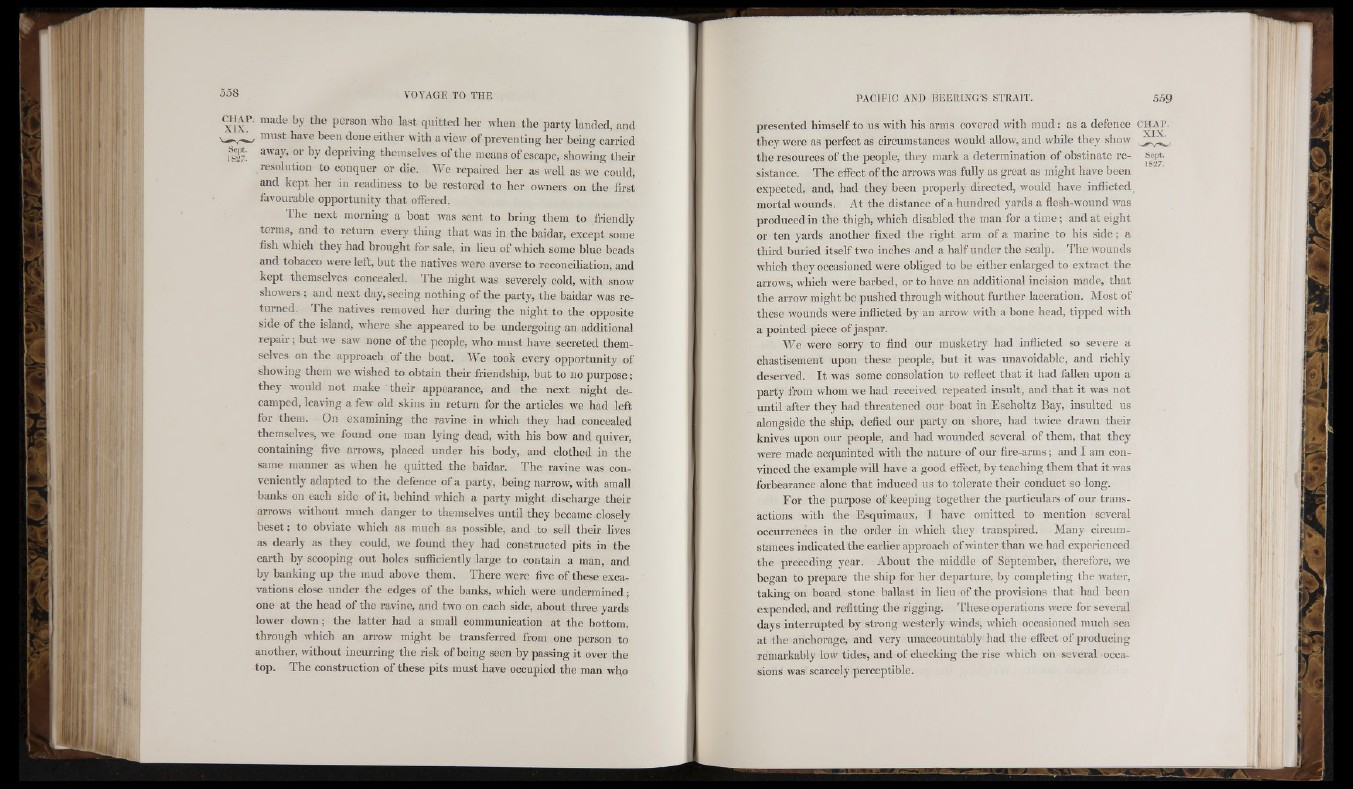
W IA P . made by the person who last quitted her when the irarty landed, and
‘ ■ must have been done either with a view of preventing her being carried
r ;il I Sept.
a 'i'M
Jj'to
- i r
l|:ll
i' i
1827.
away, or by depriving themselves ofthe means of escape, showing tlieir
resolution to conquer or die. We repaired her as well as we could,
and kept her in readiness to be restored to her owners on the first
favourable opportunity that offered.
The next morning a boat was sent to bring them to friendly
terms, and to return every thing that was in the baidar, except some
fish which they had brought for sale, in lieu of which some blue beads
and tobacco were left, but the natives were averse to reconciliation, and
kept themselves concealed. The night was severely cold, with snow
showers; and next day, seeing nothing of the party, the baidar was returned.
The natives removed her during the night to the opposite
side of the island, where she appeared to be undergoing an additional
repair; but we saw none of the people, who must have secreted themselves
on the approach of the boat. We took every opportunity of
showing them we wished to obtain their friendship, but to no purpose;
they would not make their appearance, and the next night decamped,
leaving a few old skins in return for the articles we had left
for them. On examining the ravine in which they had concealed
themselves, we found one man lying dead, with his bow and quiver,
containing five arrows, placed under his body, and clothed in the
same manner as when he quitted the baidar. The ravine was conveniently
adapted to the defence of a party, being narrow, with small
banks on each side of it, behind which a party might discharge their
arrows without much danger to themselves until they became closely
beset; to obviate which as much as possible, and to sell their lives
as dearly as they could, we found they had constructed pits in the
earth by scooping out holes sufficiently large to contain a man, and
by banking up the mud above them. There were five ofthese excavations
close under the edges of the banks, which were undermined;
one at the head of the ravine, and two on each side, about three yards
lower down; the latter had a small communication at the bottom,
through which an arrow might be transferred from one person to
another, without incurring the risk ofbeing seen by passing it over the
top. The construction of these pits must have occupied the man who
presented himself to us with his arms covered with mud; as a defence C H A P ,
tliey were as perfect as circumstances would allow, and while they show
the resources of the people, they mark a determination of obstinate resistance.
Sept.
1827.
The effect of the arrows was ful ly as great as might have been
expected, and, had they been properly directed, would have inflicted
mortal wounds. At the distance of a hundred yards a flesh-wound was
produced in the thigh, which disabled the man for a time ; and at eight
or ten yards another fixed the right arm of a marine to his side; a
third buried itself two inches and a half under the scalp. The wounds
which they occasioned were obliged to be either enlarged to extract the
arrows, which were barbed, or to have an additional incision made, that
the arrow might be pushed througli without further laceration. Most of
these wounds were inflicted by an arrow with a bone head, tipped with
a pointed piece of jaspar.
We were sorry to find our musketry had inflicted so severe a
chastisement upon these people, but it was unavoidable, and richly
deserved. It was some consolation to reflect that it had fallen upon a
party from whom we had received repeated insult, and that it was not
until after they had threatened our boat in Escholtz Bay, insulted us
alongside the ship, defied our party on shore, had twice drawn their
knives upon our people, and had wounded several of them, that they
were made acquainted with the nature of our fire-arms ; and I am convinced
the example will have a good effect, by teaching them that it was
forbearance alone that induced us to tolerate their conduct so long.
For the purpose of keeping together the particulars of our transactions
with the Esquimaux, I have omitted to mention several
occurrences in the order in which they transpired. Many circumstances
indicated the earlier approach of winter than we had experienced
the preceding year. About the middle of September, therefore, we
began to prepare the ship for her departure, by completing the w'ater,
taking on board stone ballast in lieu of the provisions that had been
expended, and refitting the rigging. These operations were for several
days interrupted by strong westerly w'inds, which occasioned much sea
at the anchorage, and very unaccountably had the effect of producing
remarkably low tides, and of checking the rise which on several occasions
was scarcely perceptible.
to ! I!